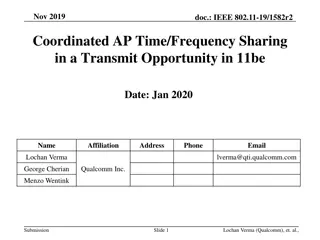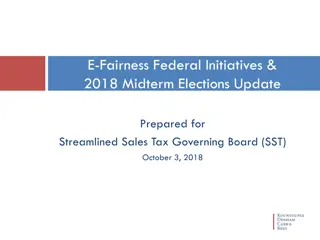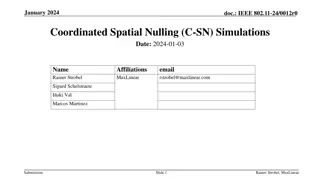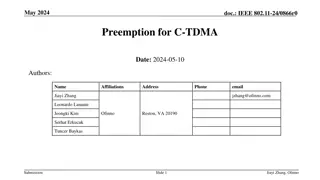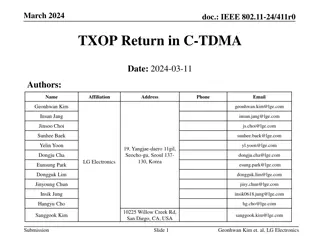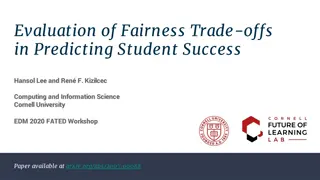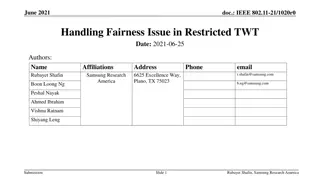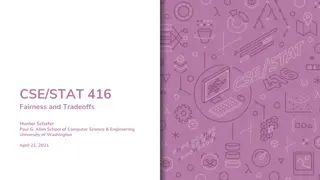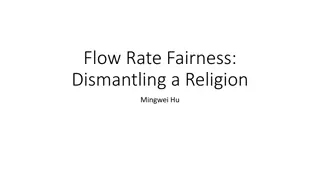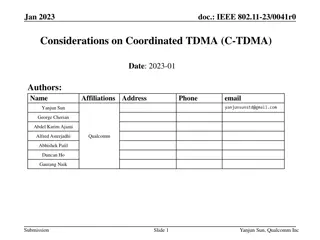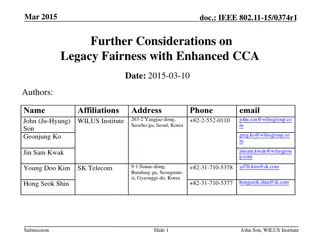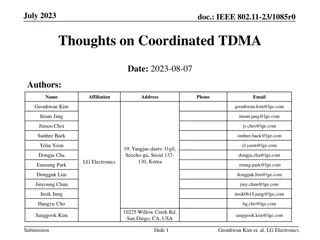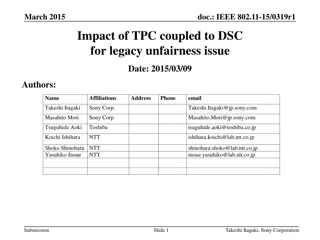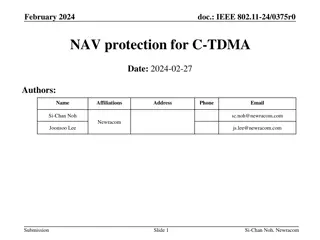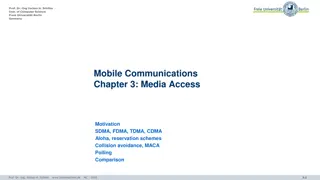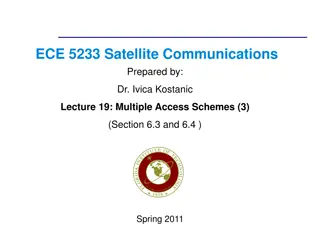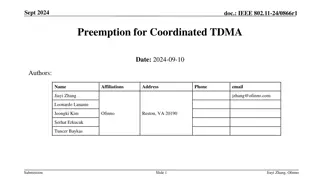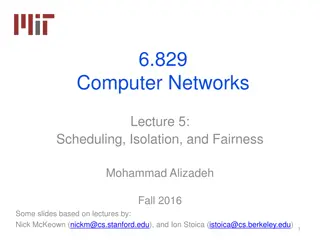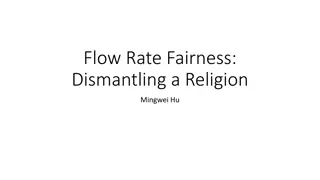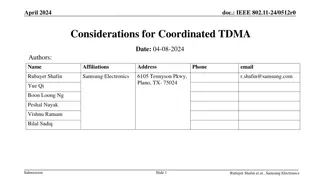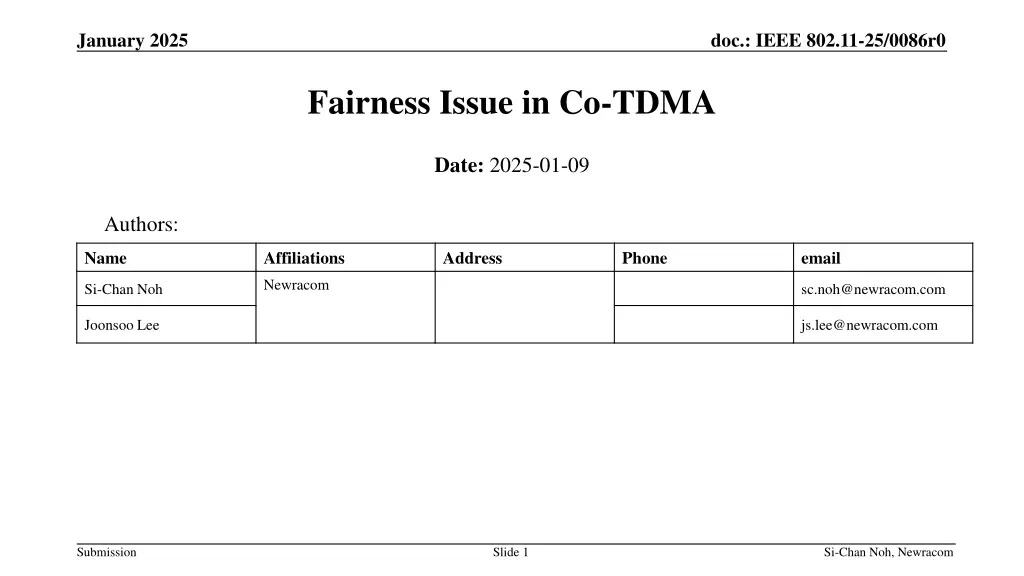
Addressing Fairness Issues in Co-TDMA Procedure
Explore the fairness challenges in IEEE 802.11's Coordinated TDMA (Co-TDMA) method, focusing on shared access points (APs) and neighboring STAs. Discover solutions for ensuring equitable channel utilization and fair contention-based access in wireless networks.
Download Presentation

Please find below an Image/Link to download the presentation.
The content on the website is provided AS IS for your information and personal use only. It may not be sold, licensed, or shared on other websites without obtaining consent from the author. If you encounter any issues during the download, it is possible that the publisher has removed the file from their server.
You are allowed to download the files provided on this website for personal or commercial use, subject to the condition that they are used lawfully. All files are the property of their respective owners.
The content on the website is provided AS IS for your information and personal use only. It may not be sold, licensed, or shared on other websites without obtaining consent from the author.
E N D
Presentation Transcript
January 2025 doc.: IEEE 802.11-25/0086r0 Fairness Issue in Co-TDMA Date: 2025-01-09 Authors: Name Affiliations Address Phone email Newracom Si-Chan Noh sc.noh@newracom.com Joonsoo Lee js.lee@newracom.com Submission Slide 1 Si-Chan Noh, Newracom
January 2025 doc.: IEEE 802.11-25/0086r0 Introduction TGbn define a Coordinated TDMA (Co-TDMA) procedure for an AP to share its time resources of an obtained TXOP with a set of APs The fairness issues in Co-TDMA are discussed : Neighboring STAs which are not participated in Co-TDMA due to NAV protection [1] Shared AP might get additional airtime through Co-TDMA [2] In this contribution, we consider the fairness issue of the shared AP and non-AP STAs that are hidden to the sharing AP, especially focus on extending the advancement approach where TXOP sharing (TXS) is applied in 11be Submission Slide 2 Si-Chan Noh, Newracom
January 2025 doc.: IEEE 802.11-25/0086r0 Recap : TXS in 11be MU EDCA parameter update When a non-AP EHT STA that receives an MU-RTS TXS frame from its associated AP that contains a User info field address to the STA shall update its CWmin/max[AC], AIFSN[AC], MUEDCATimer[AC]; From which at least one QoS Data frame was transmitted successfully in a non-TB PPDU to the AP within the allocated in the Trigger frame Start time of MUEDCATimer[AC] is depends on whether the QoS Data frame includes immediate acknowledgment or not It means that in cases where TXOP is granted through TXOP sharing procedure in 11be is rather than through fair contention-based access, it can be considered that a certain degree of channel access control was applied for a specific period(e.g., MUEDCA Timer) to those ACs that benefited Submission Slide 3 Si-Chan Noh, Newracom
January 2025 doc.: IEEE 802.11-25/0086r0 Problem definition of Fairness Issue in Co-TDMA In 11be, it can be considered that fairness with neighboring devices was taken into account when applying TXS in a single BSS In Co-TDMA, where TXOP is shared between multiple BSSs, it may be necessary to control fairness in the same manner as in as single BSS for the following scenario For example, the shared AP participating in Co-TDMA may be efficient from a low-latency perspective by being shared TXOP; However, for other neighboring STAs(i.e., especially STA that hidden with the sharing AP) that are not participating in Co-TDMA, this could be a form of channel access that is not fair contention-based; Especially, while the original TXOP holder was the sharing AP, the shared AP uses the channel through Co- TDMA without occupying the channel for the allocated time it received This could potentially raise considerations regarding fairness in channel usage Therefore, a method to control this may be necessary Submission Slide 4 Si-Chan Noh, Newracom
January 2025 doc.: IEEE 802.11-25/0086r0 Problem definition of Fairness Issue in Co-TDMA Proposal : To address fairness issue/QoS guarantee/efficient channel usage, a limitation can be applied to the shared AP As part of the proposal, in a manner comparable to the introduction of multiple EDCA tables such as MU EDCA, it is suggested that multiple EDCA tables be adopted in cases where APs perform an M-AP coordination scheme (i.e., Co-TDMA) Through this, it can ensure QoS as much as possible without compromising fairness during Co-TDMA 11be 11bn (Co-TDMA) Multiple BSSs For a shared AP that receives MU-RTS TXS TXOP sharing Subject of multiple EDCA parameter tables single BSS For a non-AP EHT STA that receives MU-RTS TXS Submission Slide 5 Si-Chan Noh, Newracom
January 2025 doc.: IEEE 802.11-25/0086r0 Summary In this presentation, we discussed on fairness issues and ways to address them in the Co- TDMA scenario, where TXOP can be shared, rather than relying on contention-based channel access Allow having multiple EDCA parameter set for the shared AP Submission Slide 6 Si-Chan Noh, Newracom
January 2025 doc.: IEEE 802.11-25/0086r0 Reference [1] 11-24/0375r1, NAV protection for C-TDMA [2] 11-24/0093r3, NAV setting for Coordinated TDMA Submission Slide 7 Si-Chan Noh, Newracom
January 2025 doc.: IEEE 802.11-25/0086r0 SP1 Do you agree to allow a mechanism to control fairness issue in Co-TDMA? Signaling details are TBD Submission Slide 8 Si-Chan Noh, Newracom

